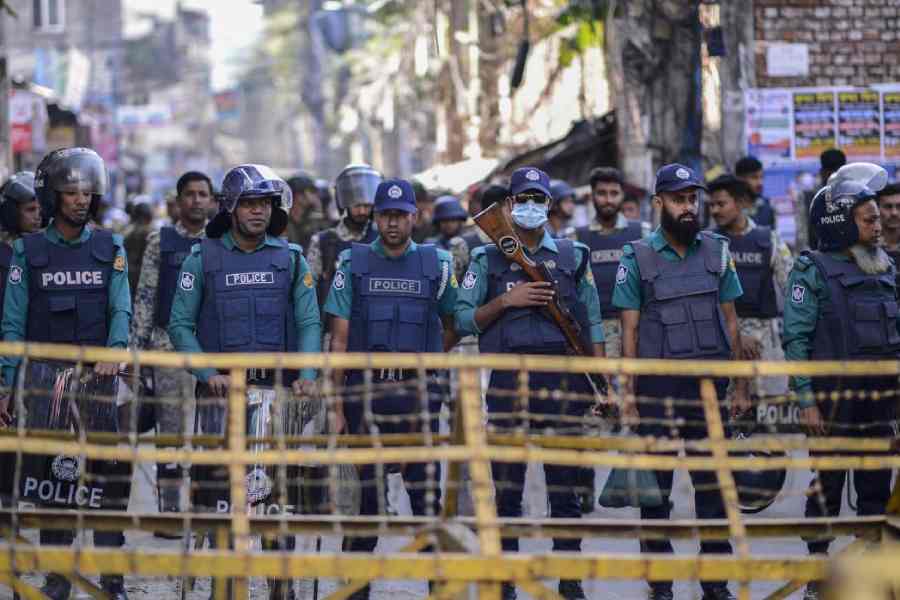Bangladeshi Hindu monk Chinmoy Krishna Das’s bail hearing in a Chittagong court did not take place on Tuesday in the absence of a lawyer to represent him, triggering allegations of intimidation and flagrant human rights violations.
Multiple sources said threats from Islamist elements in the Chittagong District Bar Association had prevented Das’s lawyers from turning up at the CMM court in the port city.
“There are about 8,000 lawyers who practise in the CMM court and the district judge’s court in Chittagong. Of these, 1,200 belong to Hindu, Christian and Buddhist communities.... The CMM court complex is in a hilly area called Court Hill, which can be accessed through two roads,” said a source.
“Besides intimidating the minority community lawyers and asking them to steer clear of the courts, the Islamists in the lawyers’ association who owe allegiance to the radical Hefazat-e-Islam and Hizb-ut Tahrir laid siege to the two roads, making it impossible for any lawyer to reach the court to represent Chinmoy Prabhu,” the source added.
The Bangladesh media reported that the next date for Das’s bail plea hearing has been fixed on January 2. Das was arrested eight days ago on sedition charges for allegedly causing insult to the Bangladesh flag.
Lawyers Ramen Roy and Rigan Acharya, who had earlier represented Das in Dhaka and Chittagong since his arrest from the Hazrat Shahjalal International Airport on November 25, are “fighting for their lives” after being attacked by the Islamists.
Sources close to Das said the monk was planning to argue his own case if he went unrepresented in court.
“The administration nipped that plan in the bud by not producing him in court.... Das could have also asked for legal aid had he been produced before the magistrate, but he was robbed of that opportunity,” said a source close to the monk.
According to the source, the administration is prolonging Das’s incarceration as the plan is to implicate him in more cases, including the killing of lawyer Saiful Islam Alif on the court premises on November 26 after a clash broke out following the denial of bail to the monk.
Barrister Tania Amir, an influential legal mind in Bangladesh, said the alleged attacks on and intimidation of lawyers and Tuesday’s developments at the CMM court were“very unusual”.
“The judge himself could have taken a call on the bail plea even in the absence of any lawyer for the accused,” she told The Telegraph over the phone.
“This incident is a glaring example of what’s happening in today’s Bangladesh, where the human rights of even lawyers are not protected. We are in the process of documenting how the lawyers have come under attack in this regime,” she added.
A source said around 70 lawyers belonging to minority communities had gone into hiding after the administration slapped murder charges on them.
Fear has gripped Hindus, Christians and Buddhists in Chittagong. “Come and visit Andarkilla, Rahmatganj, Ashkar Dighir Paar, Patharghata or Firingi Bazar, which are minority-dominated areas in Chittagong, to get a sense of the fear among us.... Most of us have closed down our shops and business establishments as we know that we can be targeted anytime,” said a septuagenarian Hindu businessman.
“I was a freedom fighter and have seen the tumultuous days of 1971.... The situation was not as bad even in those days,” added the veteran, recounting the nine-month Bangladesh Liberation War.
However, the interim regime led by Muhammed Yunus has stuck to its narrative that reports of minority oppression were part of a misinformation propaganda drive by the Indian media.
“Come and visit Andarkilla, Rahmatganj, Ashkar Dighir Paar, Patharghata or Firingi Bazar, which are minority-dominated areas in Chittagong, to get a sense of the fear among us.... Most of us have closed down our shops and business establishments as we know that we can be targeted anytime,” said a septuagenarian Hindu businessman.
“I was a freedom fighter and have seen the tumultuous days of 1971.... The situation was not as bad even in those days,” added the veteran, recounting the nine-month Bangladesh Liberation War.
However, the interim regime led by Muhammed Yunus has stuck to its narrative that reports of minority oppression were part of a misinformation propaganda drive by the Indian media.
Yunus’s media secretary, Shafiqul Alam, held a news conference on Tuesday to iterate that the situation was under control across Bangladesh and all due processes were being followed in matters related to law and order.
Alam, other government insiders and senior BNP leaders, including acting chairperson Tarieq Rahman, came down heavily on India over the alleged security breach at the Bangladesh assistant high commission in Agartala following which the authorities stopped consular and visa services at the facility.
“The Indian government not only condemned the incident without any delay, several people have also been arrested.... What did the Yunus government do after the Indira Gandhi Cultural Centre in Dhaka was gutted on August 5?” asked Bangladeshi actress Rokeya Prachi in a Facebook post.
Similar questions on the alleged lack of action by the Yunus government in cases related to violence against the minorities since the fall of the Sheikh Hasina government on August 5 have begun doing the rounds on social media.
“This government is doing irreparable damage to the country by not making any efforts to restore law and order,” said a Bangladeshi national who recently secured a visa to the US and relocated there. “Right-thinking people are trying to run away from Bangladesh.”











